- Home
- Chris Wooding
Velocity Page 2
Velocity Read online
Page 2
“Alright, I will,” she replied with a smile, because that was what she’d hoped he’d say. Blane’s generosity depended on his mood. Getting something out of him was a matter of tactics and timing, like racing.
“Did a good job out there. Keepin’ enough back to take on that jump.” He shook his head. “How’d you ever work out the ratios? Fuel weight, tire wear, engine stress. Couldn’t keep it all in my head. You’ve got a gift, Shiara. You do.”
“Thanks, Daddy,” she said. She let him carry on believing they’d planned the jump from the start. Safer that way. He didn’t know Cassica like she did.
She looked out over the road that ran past the Point, to where an enormous billboard presided over the cookout, displaying a poster bleached by years of sun. It had been there since she could remember, familiar as family: that handsome, attractively lined face, the wicked smile that promised sass and seduction, the dewed bottle raised to the town below. GOOD-BYE TO THE DRY, said the shoutline. RUTTERBY LAKEYNE DRINKS FAZZ!
There wasn’t a kid in Coppermouth who didn’t know that face intimately: his crafted hair, skin without a mark, teeth white and even. No one knew anyone with a face like that. His perfection made him otherworldly. A Celestial, come down from Olympus to grace them with one simple message: that Rutterby LaKeyne drinks fazz, and you should too.
Someone should probably tell him he needn’t bother anymore, thought Shiara. Since the processing plant packed in, it was easier to get fazz than drinking water, and cheaper too. You could drop iodine tablets in a bucket from the tap, or boil it, but nobody liked the taste and the shops kept running out. Pretty much everyone who wasn’t drinking coffee or alcohol drank fazz, and when they got sick of one flavor, they just switched to another.
“Great drive, Cass! You killed it!”
Benno gave her a double thumbs-up as he passed, and she raised a hand in thanks, elbows resting on the old metal safety barrier that ran round the edge of the Point. Beyond, a cliff fell away to the river. The harbor was visible down there, only fishing boats in dock since it all silted up and killed the town. Past that lay the glittering immensity of the lake, big as the horizon, so huge it never seemed to end. Usually Cassica loved looking out there, loved how limitless it was. But Card was being funny again—funny weird, not the other kind—and it was getting on her nerves. She heard him sigh in pointed irritation as Benno headed off.
“What?” she demanded.
He ignored her, preferring to sulk. Everyone was having a fine time but Card, which was pretty much typical. He only got away with it because he made sulking look so good.
Somewhere nearby, she heard a terrible hacking cough ringing out over the crowd. A little chill went through her. Mrs. K had the dust lung bad. It wouldn’t be long for her. The sound spoiled Cassica’s mood further, made her want to pick a fight.
“You weren’t there this morning,” she said.
He sensed the accusation and bristled. “I had to patrol for jackwolves, didn’t I?”
“You knew I was racing. You could’ve swapped your shift.”
“Oh, right. And I gotta tell my boss every time you go for a drive?”
Purposely missing the point. She rolled her eyes. “Forget it.”
“Yeah, let’s,” he said with a faint sneer. He eyed her over; she was still slouched against the barrier. “Stop doing that,” he told her.
“Doing what?”
“The barrier’ll give way.”
Cassica stared at him incredulously. “It’s been here longer than I’ve been alive.”
“Yeah, so it’s old, and it’ll break if you lean on it like that. You wanna go over the cliff?”
Cassica shoved herself off the barrier, turned around, and kicked it hard with the sole of her foot. It didn’t budge. Point proven, she glared at him challengingly and then stalked away. He didn’t follow.
Sometimes she wondered why she wasted her time with him at all. The truth was, she couldn’t help it. It was his face, his hair, the smell and feel of him. Most of all it was the knowledge that he wanted her as badly as she wanted him. They bickered and fought a lot, but he was sweet sometimes and irresistible always. Even when he was being an ass she wanted to jump him—more than when he wasn’t, in fact—but she wouldn’t give him the satisfaction. That would be letting him win, and a boy that fine was too accustomed to winning already.
A bunch of the younger girls roped her in to show her their dance routine. They’d set themselves up in front of a battered plastic audiodeck and were blasting out songs from a hit parade of Celestials. She perched on a table and watched as they pranced and posed to a Lissy Malp number, and at the end she applauded gravely to show she was serious about how good they were. The girls, delighted, ran off to find somebody else to impress.
By the time the dance was done, her anger at Card was forgotten. She was always quick to argue, quick to forget. She sought out Shiara, finding her at the grill with Blane.
As she headed over, the rude, throaty clatter of engines caught her attention.
They came up the road from the highway, following the music and the crowd. Four of them, bikes darkened with dirt and hung with totems that spoke of Howler lands. There was a wildness to them, a swagger that set them apart from the kind of folk who’d settle in a dead town like Coppermouth. Everyone sensed it, and the joy was sucked from the crowd and replaced with wary fear. They carried holstered shotguns on their bikes. These were not predictable sorts. They could be trouble, if they had a mind. The kind of trouble that left bodies in its wake.
The first of them put out his kickstand, rested his bike, and swung his leg over. There were pistols at his waist, a knife in a leather sheath on his forearm. He seemed a man held together with tattoos and scars, a warrior risen from the asphalt to loot and burn.
“Who is it runs the auto shop back there on the highway?” he called in a voice made smoky by drink.
Blane laid the meat down with a sizzle on the grill and put aside the tongs. “That’d be me,” he called back and turned around to face the man.
“We’re in need of seein’ to,” the biker said.
“Shop’s closed,” Blane replied. “Won’t open till the morrow.”
The biker chewed his lip. “We need seein’ to now.”
“They can see to you in Southtown. Two hours on the highway. You head off now, you’ll be there before they close up.”
The biker appeared to consider that, but he wasn’t moving and nobody was fooled.
“This here cookout’s for my daughters,” said Blane. “One mine by natural means; the other I’m guardian of. They won the Jessen Plains race just this mornin’.” It was an appeal, to their good nature and their love of speed. Move on. We don’t want any trouble here. Nobody has to lose face.
The biker’s gaze found Shiara. Cassica joined them by the grill, half out of solidarity and half for protection.
“That so?” said the biker. His eyes lingered on Cassica for an uncomfortably long moment, then flicked back to Blane. “Tell you what,” he said. “We gonna go back to the shop, and if there ain’t no one there to sell us what we want for fair coin, we’ll just break in and take it. And more besides. How’s that?”
Shiara’s heart sank as she watched her daddy face off against the biker, his big fist clenching and releasing as he searched for a way to come out of this with some pride intact. There wasn’t much worse than being made another man’s servant, except if it was done where others could see. But even if the men of Coppermouth had had their guns, there’d be only one outcome here. Too many kids and women nearby to be otherwise.
“Why don’t you see to the grill?” Blane told Shiara. “Make sure everyone gets a piece?”
“I’ll come with you,” she said. “You’ll need more hands.”
“Me and Creek can handle it,” he said. “It’s your day. You stay.”
He walked away from her, calling for her brother. His shoulders were slumped in shame as he went to do the biker’s bidd
ing. She watched him go, anger making blooms on her pale cheeks and forehead.
In other towns, there were squads of Justices that saw to law and order. Men paid to defend decent folk so they couldn’t be bullied this way. But there was no Justice in Coppermouth; not anymore.
It always began with bare feet on floorboards. Soft steps creeping. Her little-girl’s nightie flapped around her shins, covered in moons and shooting stars fast and numerous as wishes. She knew the spots where the wood would groan. Don’t wake Momma. Momma needs her rest.
The corridor was a shadowed throat, dark with the dawn. She dared to raise her head and look. The door at the end pulled away as she approached, air treacly with dread in the way of dreams. She didn’t want to see what was behind it, but she was carried forward by her feet.
Don’t wake Momma. But she had to check. The little girl had been up every few hours in those last days, when Momma couldn’t so much as raise herself from her pillow to take soup. Sometimes the little girl slept too long, taken by exhaustion, and she’d wake in a panic, afraid that her lack of vigilance had caused her momma’s end.
Hand on the door, she pushed. The hinges were silent in her dream.
Momma’s room had the smell of death to it. The gray first light of day pressed against the windowpane. The little girl didn’t look at the bed; first she went round the room, touched light fingers to the old wooden chair, the dresser scattered with powders and creams, the curtains gone musty since Momma stopped washing them. It was a ritual, a superstition. If she did everything just right, maybe Momma wouldn’t die.
Finally she turned to the bed. Momma had yellowed and turned witchlike of late, and it frightened the little girl. Her nose was a sinewed fin in her face, her chin gone loose, neck scrawny. Momma dragged in a breath as if with chains and hooks; it tumbled and clattered out of her. Then something tripped in her chest and she began to cough, that horrible raling cough, bad enough heard through the door but unbearable up close. In the dream, each cough threw out a thin cloud of red dust, and when Momma settled again there was a haze of it hanging over her.
She was wrapped in blankets, tucked up to the collarbone. The little girl reached for the edge of the coverlet, fearing to see what was beneath. She peeled back a layer and looked.
A thin frail arm, a clawlike hand lay exposed. But what looked like skin was not; as she peered close, she saw that the tips of Momma’s fingers were worn away, and there was powder on the bedspread beneath. Suddenly she knew, with a kick of cold terror, that her mother was all turned to dust, and that the slightest disturbance would cause her to crumble. She should never have lifted the coverlet, never looked beneath.
If she could only lay it back with enough care, then all might be well again. But no matter how she tried, the result was always the same in her dream. Momma came apart, puffing out from beneath the coverlet in soft clouds, her face caving like a broken sandcastle. The little girl backed away tearfully as the room filled with red dust, and the stinging in her eyes drove her awake.
Cassica stared at the ceiling and let the sadness take her: a profound, aching sense of loss, beginning low in her belly and spreading to her chest. Cool tears slipped down her face. She knew it was better not to fight it, so she focused on the grain of the wood in the planks above her, the feel of the rough-spun wool blanket against her skin, all the things of the here and now—and she waited for it to pass.
Pink sunlight warmed the room. It was simple and small, two beds with a chest and dresser between. Shiara was a hump in the other bed, her blanket pulled over her head, curled up in the stuffy dark. Her breath came in heavy sighs. Cassica listened, and it comforted her. She didn’t like it when she couldn’t hear her friend breathing.
Shiara didn’t come to breakfast. She wanted to work on Maisie before the shop opened. Cassica found her afterward, oily fingers deep in Maisie’s guts, and delivered a tray set with coffee, flour biscuits, and a bowl of goat gravy.
“You know how your mom is,” said Cassica.
Shiara wiped off her hands on her overalls, dunked a biscuit in the gravy, and crunched it absently, still staring at the tangle of pipes and cables before her. A radio played in the cool, shady depths of the auto shop, hidden somewhere among the quiet vehicles waiting for attention.
“How is she?” Cassica asked. She stood well back; she’d catch hell if she got oil on her waitress uniform.
“Well, the piston rings are shot, so are the bearings, we pretty much trashed the turbo system, and there’s a crack in one of the cylinders. Plus the camshaft I’m getting off Daddy.” She took another bite of her biscuit. “Gonna cost us everything we won in that last race to fix her.”
“You want me to go easier on her next time?”
Shiara gave her a look. Cassica grinned. As if she would.
There was a violent clatter as the security shutters were rolled back, casting sunlight across the interior. Shiara’s brother Creek sloped into view, dusting his hands.
Cassica checked the clock in mock disbelief. “Is that who I think it is? Opening up, no less?”
Shiara frowned. “Daddy had words last night.”
They watched him as he mooched his way over to the office. Creek was lean like dried meat, face set in a permanent scowl, mouth puckered and nose scattered with freckles. There was a dullness about him, like just talking to another person made him weary. He had no love for his daddy’s business and made no secret of it, preferring the lonely wild places where he could hunt.
But he’d get the shop when Blane gave it up, by dint of age and because their customers wouldn’t trust a female mechanic. It went down easier if they saw a man in charge, even if it was a girl doing the work. Creek would be the face of the place, Shiara the talent.
It ate at her from time to time, but Shiara wasn’t the kind of person to rail against things she couldn’t change. All the arguments in the world wouldn’t stop their customers driving on to Southtown, where the staff better suited their expectations. Daddy knew she was the better mechanic. That was what counted.
“Qualifier for the Widowmaker tonight,” said Cassica, tapping her fingers against her thigh. She’d been still too long and was restless.
“Gonna listen on the radio. Reckon you can catch it at the diner?”
“Gonna try,” said Cassica. “Speaking of which, I better get. Have a good one.”
“You too.”
“Y’know, we should go in for one of those qualifiers,” Cassica tossed over her shoulder as she left. “Blane could join the guild, be our official manager.”
“Yuh. Just need to win another fifty of them races and we might just scratch the entrance fee!” Shiara called.
Cassica’s laughter trailed after her, out into the fierce light of the new day.
A solitary fan beat the air in Gauge’s Diner; the other hadn’t worked in a while. Slat windows cut the sun into strips, and a damp, close heat hung in the air. Outside lay a stony forecourt, and past that, the highway. A doghawk hunched on a rusted water tower, licking its underwing, worrying at feathers with its teeth.
The only diners here were a scav family, on their way up to the Rust Bowl to pick over the wasteland for pieces of the war no one else had found yet. They had a resigned look to them; they knew their chances, but knew no better way. Cassica doled out their plates with extra perkiness to compensate.
“Spicy snake stew for you, tuber chips, there’s your pigeon burger, and you had eggs, cornbread, and grits. Honeyed locusts to start and a bottle of original fazz for the table. Now, can I get you anything else? No? Enjoy your meal.”
Gauge watched them with half an eye from behind the counter, a suspicious ogre lurking in the gloom. The scavs didn’t look like they could afford to eat this way too often, and someone had skipped out on a bill yesterday. But Cassica reckoned they were alright, just a poor family spending big on a morale-boosting last feast before they headed into hardship. There’d be no diners in the Rust Bowl.
She carried her tr
ay back into the kitchen, where the rest of the staff was watching a crackling television set on top of a fridge. It was showing the buildup to a qualifier, one of a series of elimination events that culminated in the Widowmaker, the pinnacle of the Maximum Racing season and the most hotly contested rally in the world. Cassica settled herself back in her spot on the worktop as the camera panned across a sleek black car, its silver exhaust pipes and alloys gleaming, logos plastered over its flanks, spoilers, and fins.
“Who’s driving that?” she asked enviously. She struggled to hear the commentator; the audio was barely more than a hiss.
The camera cut to the driver, drawing a loud whoop from Beesha, the only other female in the room. The boy in the frame was a study in sullen beauty, black hair raked across his brow, lips pursed in a pout, one ear heavy with rings. KYREN BANE, read the caption.
“I would take a piece o’ him!” Beesha announced, slapping the counter.
The cooks laughed. “That pretty thing? Boy’d spend longer in the bathroom than you would!”
“Boy could have his own bathroom if he came out lookin’ like that every mornin’.” Beesha cackled happily at the thought.
“Hoy! Cassica’s in love!” crowed the busboy, and Cassica, too late, realized what had been written all over her face. The boy was like a statue from the old times, like something legendary. For just a moment, she’d been awestruck.
“Well, she ain’t blind!” Beesha cried, and everyone laughed. Then the television switched to a race, footage from last season, and their attention was snared. The waitress gave Cassica a sidelong wink. Cassica kept quiet, feeling lucky to escape a ribbing, thankful to Beesha for deflecting it.
Cassica recognized the footage; she’d seen it a dozen times. It was a moment that had drawn a collective gasp from the world, as relentless nice-guy Chabley Pott—people’s favorite and tipped to win—went out on the first day of the Widowmaker.

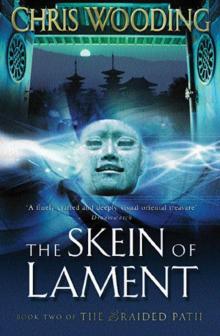 The Skein of Lament
The Skein of Lament Braided Path 03 - The Ascendancy Veil
Braided Path 03 - The Ascendancy Veil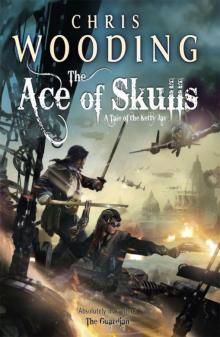 The Ace of Skulls
The Ace of Skulls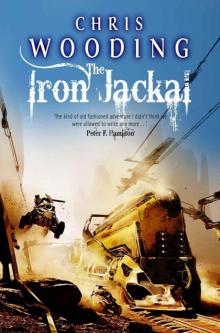 The Iron Jackal
The Iron Jackal The Haunting of Alaizabel Cray
The Haunting of Alaizabel Cray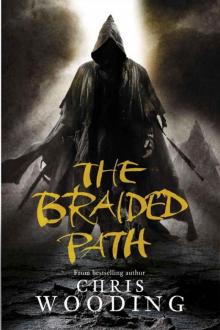 The Braided Path: The Weavers of Saramyr / the Skein of Lament / the Ascendancy Veil
The Braided Path: The Weavers of Saramyr / the Skein of Lament / the Ascendancy Veil Storm Thief
Storm Thief Silver
Silver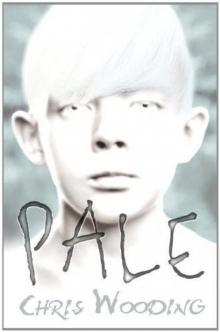 Pale
Pale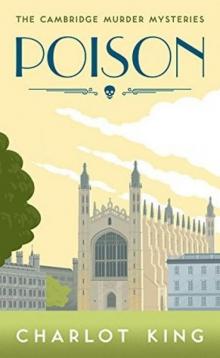 Poison
Poison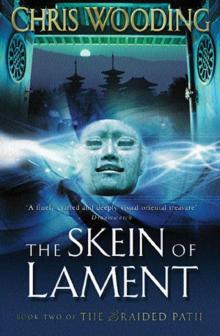 Braided Path 02 - The Skein Of Lament
Braided Path 02 - The Skein Of Lament The Ember Blade
The Ember Blade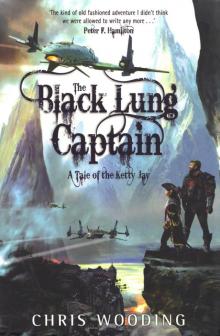 The Black Lung Captain
The Black Lung Captain Out of This World
Out of This World The Braided Path: Ascendancy Veil Bk. 3
The Braided Path: Ascendancy Veil Bk. 3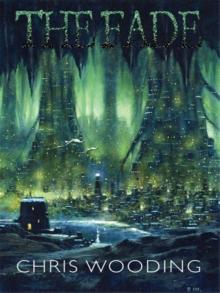 The Fade kj-2
The Fade kj-2 The Ascendancy Veil: Book Three of the Braided Path
The Ascendancy Veil: Book Three of the Braided Path Retribution Falls totkj-1
Retribution Falls totkj-1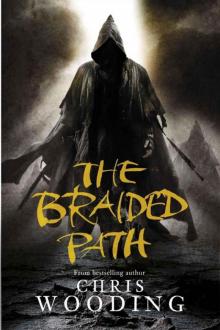 The Braided Path: The Weavers of Saramyr, The Skein of Lament and the Ascendancy Veil
The Braided Path: The Weavers of Saramyr, The Skein of Lament and the Ascendancy Veil Ketty Jay 04 - The Ace of Skulls
Ketty Jay 04 - The Ace of Skulls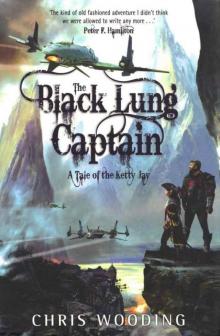 The Black Lung Captain totkj-2
The Black Lung Captain totkj-2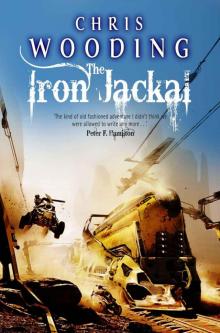 The Iron jackal totkj-3
The Iron jackal totkj-3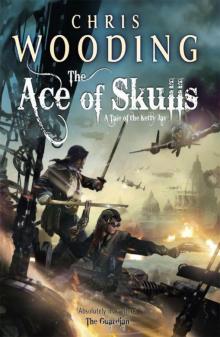 The Ace of Skulls totkj-4
The Ace of Skulls totkj-4 The ascendancy veil bp-3
The ascendancy veil bp-3